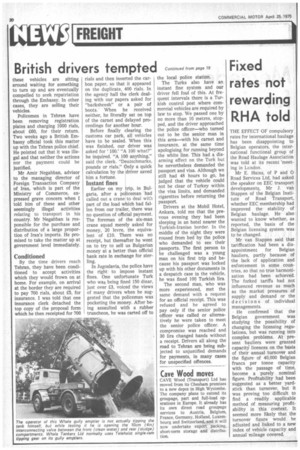British drivers tempted
Page 22

If you've noticed an error in this article please click here to report it so we can fix it.
these vehicles are sitting around waiting for something to turn up and are eventually compelled to seek repatriation through the Embassy. In other cases, they are selling their vehicles.
Policemen in Tehran have been removing registration plates and charging 1000 rials, about £60, for their return. Two weeks ago a British Embassy official took this matter up with the Tehran police chief. He pointed out that it was illegal and that neither the actions nor the payment could be justified.
Mr Amir Negahban, advisor to the managing director of Foreign Transaction Company of Iran, which is part of the Ministry of Commerce, expressed grave concern when I told him of these and other seemingly illegal activities relating to transport in his country. Mr Negahban is responsible for the purchase and distribution of a large proportion of Iran's imports. He promised to take the matter up at government level immediately.
Conditioned
By the time drivers reach Tehran, they have been conditioned to accept activities which they would frown on at home. For example, on arrival at the border they are required to pay 700 rials, about £5, for insurance. I was told that one insurance clerk •detached the top copy of the proposal form which he then receipted for 700 rials and then inserted the carbon paper, so that it appeared on the duplicate, 400 rials. In the agency hall the clerk dealing with our papers asked for "backsheesh" or a pair of boots. When he received neither, he literally sat on top of the carnet and delayed proceedings for another hour.
Before finally clearing the customs car park, all vehicles have to be sealed. When this was finished, our driver was asked for '100.' "A 100 what?" he inquired. "A 100 anything," said the clerk. "Deutschmarks, pounds or rials." Only a quick calculation by the driver saved him a fortune.
Instant fines
Earlier on my trip, in Bulgaria, after a policeman had called out a crane to deal with part of the load which had fallen from our trailer, there was no question of official payment. The foreman of the six-man crane squad merely asked for money, 20 levre, the equivalent of £10. There was no receipt, but thereafter he went on to try to sell us Bulgarian money at a better than official bank rate in exchange for sterling.
In Jugoslavia, the police have the right to impose instant fines. One unfortunate Turk who was being fined 150 dinar, just over £3, voiced the views of many drivers when he suggested that the policeman was pocketing the money. After being assaulted with a rubber truncheon, he was carted off to




















































































